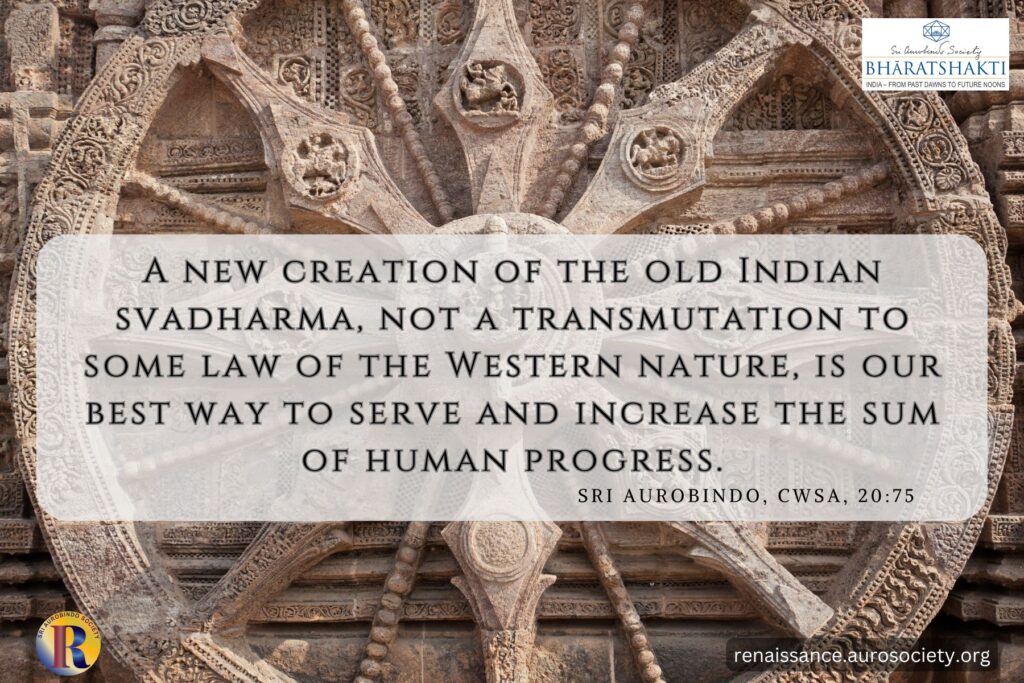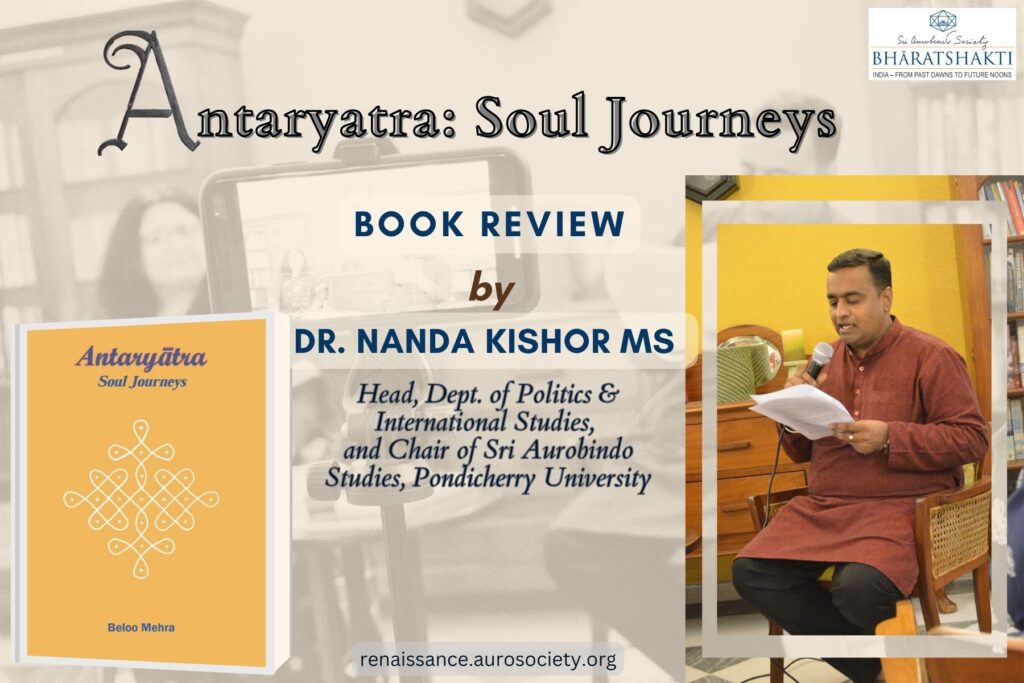Editor’s Note: We have selected passages from three writings of Sri Aurobindo, from Bande Mataram, Karmayogin and Dharma to highlight some of his insights on the true nature of Indian nation towards which we must aspire and work. These passages specifically focus on the point that the idea of unity in diversity is inherent in the very nature of Indian idea of nation. We also get important hints in these passages on the Hindu spirit of Indian nationalism, a topic that is very timely and significant for today’s and tomorrow’s India.
We have made a few formatting revisions for the ease of virtual reading, with no alterations in the original text.

What is a Nation?
In India, they say, there are thousands of castes and subcastes, countless sects and subsects, and any number of religious creeds with differences of opinion and practice; in that case the use of the word “national” in the Indian situation becomes meaningless.
But these people do not really understand what is meant by a nation. They suggest that a nation can only come into existence when these castes and creeds are abolished. But this line of argument—that we will have a nation only when everyone in the country has the same religion and there is only one caste—is a fallacious one, for religion and caste are not permanent aspects of a nation.
Other people argue that although India is a vast country geographically, still it cannot be termed a nation. But we view it differently.
To us, by its very geography the country appears to be quite distinct from other countries, and that itself gives it a certain national character…. The inner and outer body of India, the customs, culture and religion of its people, have an independent character different from those of the rest of the world. It has its foundations in the ancient past.

Essential Peculiarity of India’s National Life
Those who say that caste and religious differences must first of all be destroyed before India can ever rise to the status of a nation, have very hazy and confused notions regarding the character and constitution of that nation. Our history has been different in many respects from the history of other peoples.
The composition of the Indian people has been unique in all the world. Nations grew in the past by the accretion and assimilation of different tribes. This is an earlier process. But India has not been a mere meeting place of tribes, but a meeting place of grown up nations with developed social and religious lines of their own, and with original castes and types of cultures peculiar to them.
Also read:
Indian Nationalism and Yoga
The character and composition of the coming Indian nation, therefore, will differ very materially from those of the European nations, the process of unification among whom took place at a much earlier and comparatively more nebular stage of their growth. This is a fact which our old school politicians and social reformers do not seem as yet to have had any time to think of, and we are not hopeful that even now, after it is pointed out to them, in the plainest language possible, they will have the patience to do so and recognise this essential peculiarity of our infant national life.
Federal Nature of Indian Nation
The nation-idea in India will realise itself, in all its departments, along what may be called federal lines,—it will be a union of different nationalities, each preserving its own specific elements both of organisation and ideal, each communicating to the others what they lack in either thought or character, and all moving together towards one universal end, both in civic and social life, progressively realising that end along its own historic and traditional lines, and thus indefinitely drawing near to each other, without, for an equally indefinite period, actually losing themselves in any one particular form of that life, whether old or new.
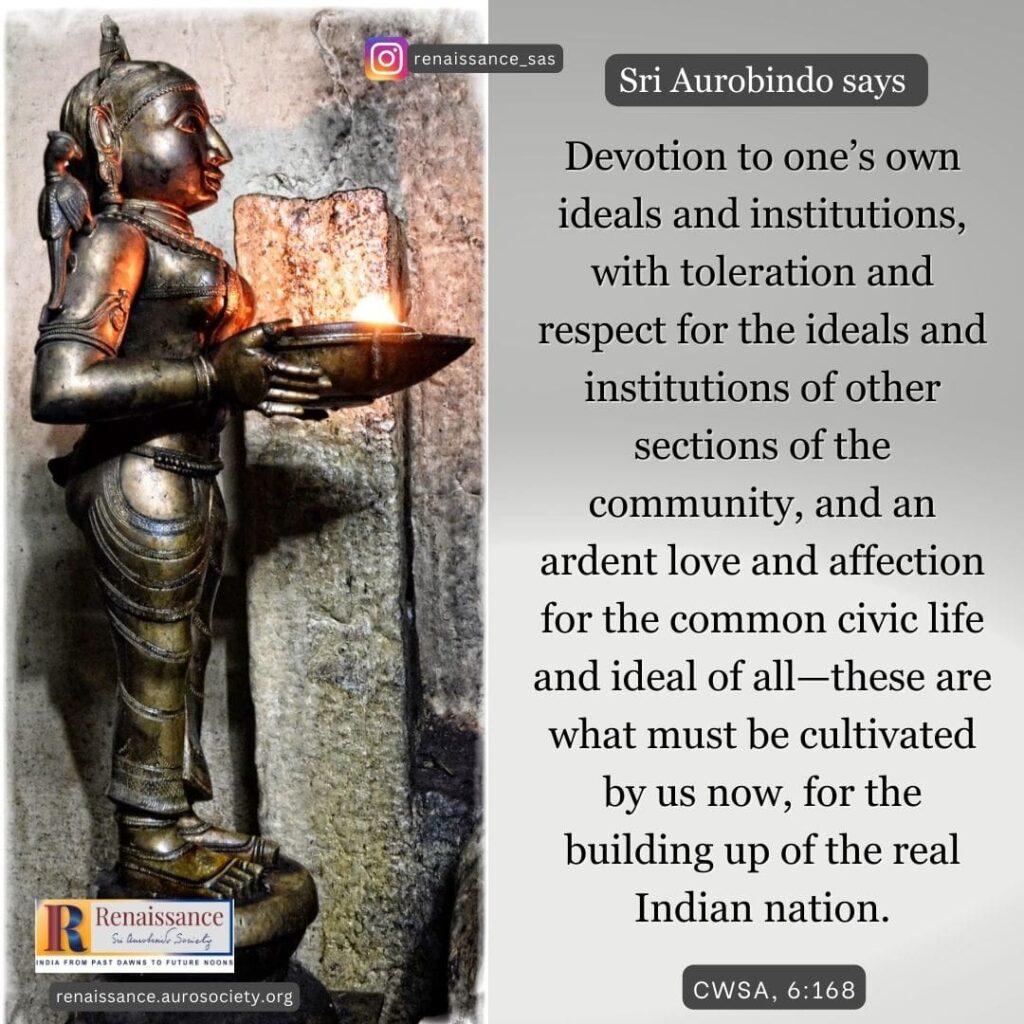
The Mahomedan, the Hindu, the Buddhist, the Christian in India will not have to cease to be Mahomedan, Hindu, Buddhist, or Christian, in any sense of the term, for uniting into one great and puissant Indian nation. Devotion to one’s own ideals and institutions, with toleration and respect for the ideals and institutions of other sections of the community, and an ardent love and affection for the common civic life and ideal of all—these are what must be cultivated by us now, for the building up of the real Indian nation.
To try to build it up in any other way will be impossible, whether that way be the way of the Brahmo, the Christian, or the propagandist Mahomedan.
To make any attempt along any of these lines, will not make for but work against national unity; and the reckless men who . . . persist in their folly, instead of bringing the different races and religions together, only help to arouse the opposition of orthodoxy everywhere, and drive the great forces that range always with orthodoxy to an attitude of open hostility to the great national movement, and bring about a reaction that will seek to accentuate those very differences and tighten those very bonds of caste and custom which in their unphilosophic and unscientific zeal they are trying by these wrong and obtrusive methods to obliterate and loosen.

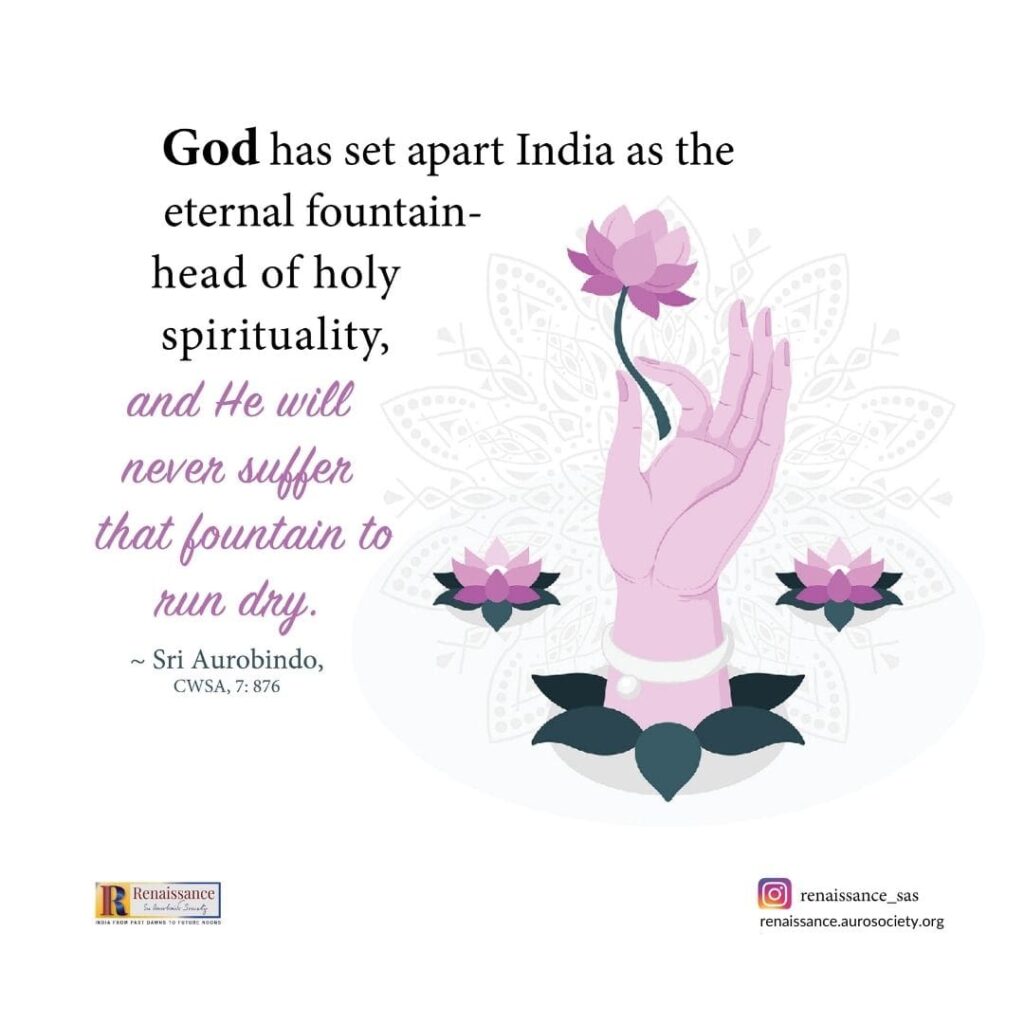
Country as the Foundation of Nationalism
The country and nothing but the country is the foundation of Nationalism, neither the nation, nor religion, nothing else matters. All other elements are secondary and contributory, it is the country alone that is primary and essential. Many mutually exclusive races live in the land, perhaps there never was enough goodwill, unity or friendliness. What is there in that to worry about? When it is one country, one Mother—there is bound to be unity one day, and out of the union of many races shall emerge a strong and invincible nation.
Our religious views may differ, there might be endless conflict among the communities, neither concordance nor any hope of concordance, still one need not have any misgivings. By the powerful magnetic attraction of the Mother embodied in the country, by fair means or foul—whether by mutual understanding, or by force or by appeasement—harmony will be achieved; communalism, separation will be drowned in fraternal feelings, in a common love and worship of the Mother.
In a land of many languages brother is unable to understand brother, we do not sympathise with each other’s feelings, between heart and heart there are immense barriers. These have to be overcome with much effort. Yet one need not fear. There is the same current of thought in every mind, of one country, one life, and under pressure of need a common language is bound to evolve, either one of the existing languages will come to be accepted, else a new language will be created. In the Mother’s temple all will use that language.
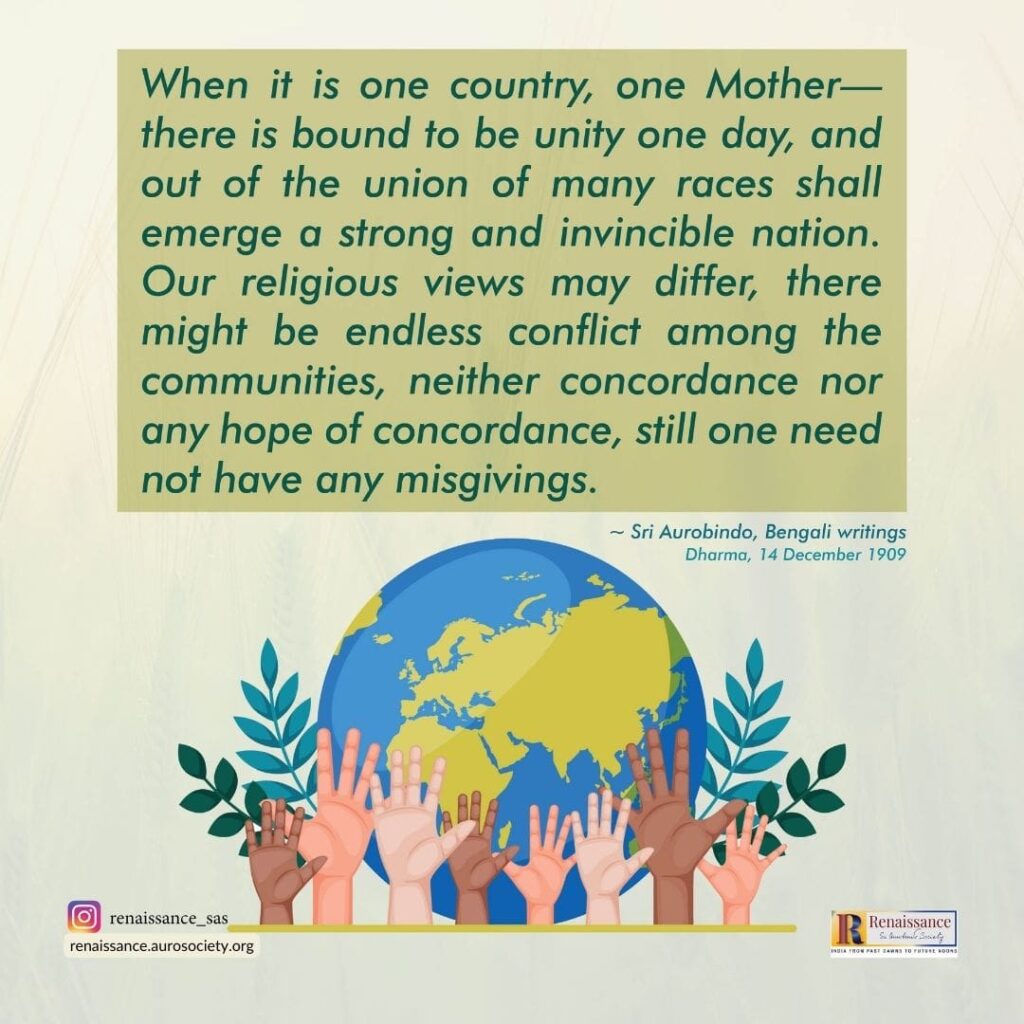
Born of the Same Mother
There is nothing permanent about these obstacles. The Mother’s need, her attraction and deeper desire are not to be frustrated, these will surmount all obstacles and conflicts. Born of the same Mother, on her lap we live, in her five elements we merge and melt, in spite of a thousand real dissensions we shall unite at Her call. This is a law of Nature, the lesson of history everywhere: the country is the base of nationalism, an inevitable bond.
Where there is a country of one’s own, nationalism is bound to be there. On the other hand, if the country is not one, even if the race, the religion and the language are the same, nothing will come of that. One day a separate race is sure to appear.
By yoking together separate countries a great empire may be built. But that is not how a great nationality comes about. When the empire declines, separate nations spring up. Very often it is this inherent separativeness that causes the empire to crash.
~ Dharma, No. 14, December 1909
CWSA, Vol. 9, Bengali Writings

Hindu Nationalism?
The strength of Islam lay in its unity and cohesion, the fruit of a long discipline in equality and brotherhood, the strength of the Hindu in flexibility, progressiveness, elasticity, a divination of necessary changes, broad ideas, growing aspirations, the fruit of a long discipline in intellectual and moral sensitiveness. . . .
There are only two things strong enough to unite Hinduism, a new spiritual impulse based on Vedanta, the essential oneness of man, the transience and utilitarian character of institutions, the lofty ideals of brotherhood, freedom, equality, and a recognition of the great mission and mighty future of the Hindu spiritual ideas and discipline and of the Indian race,—or else a political impulse strong enough to unite Hindus together for the preservation and advancement of their community. . .
Not that we are blind to facts,—not that we do not recognise Hindu-Mahomedan rivalry as a legacy of the past enhanced and not diminished by British ascendancy, a thing that has to be faced and worked out either by mutual concession or by a struggle between nationalism and separatism. But we do not understand Hindu nationalism as a possibility under modern conditions.
Hindu nationalism had a meaning in the times of Shivaji and Ramdas, when the object of national revival was to overthrow a Mahomedan domination which, once tending to Indian unity and toleration, had become oppressive and disruptive.
It was possible because India was then a world to itself and the existence of two geographical units entirely Hindu, Maharashtra and Rajputana, provided it with a basis. It was necessary because the misuse of their domination by the Mahomedan element was fatal to India’s future and had to be punished and corrected by the resurgence and domination of the Hindu. And because it was possible and necessary, it came into being.
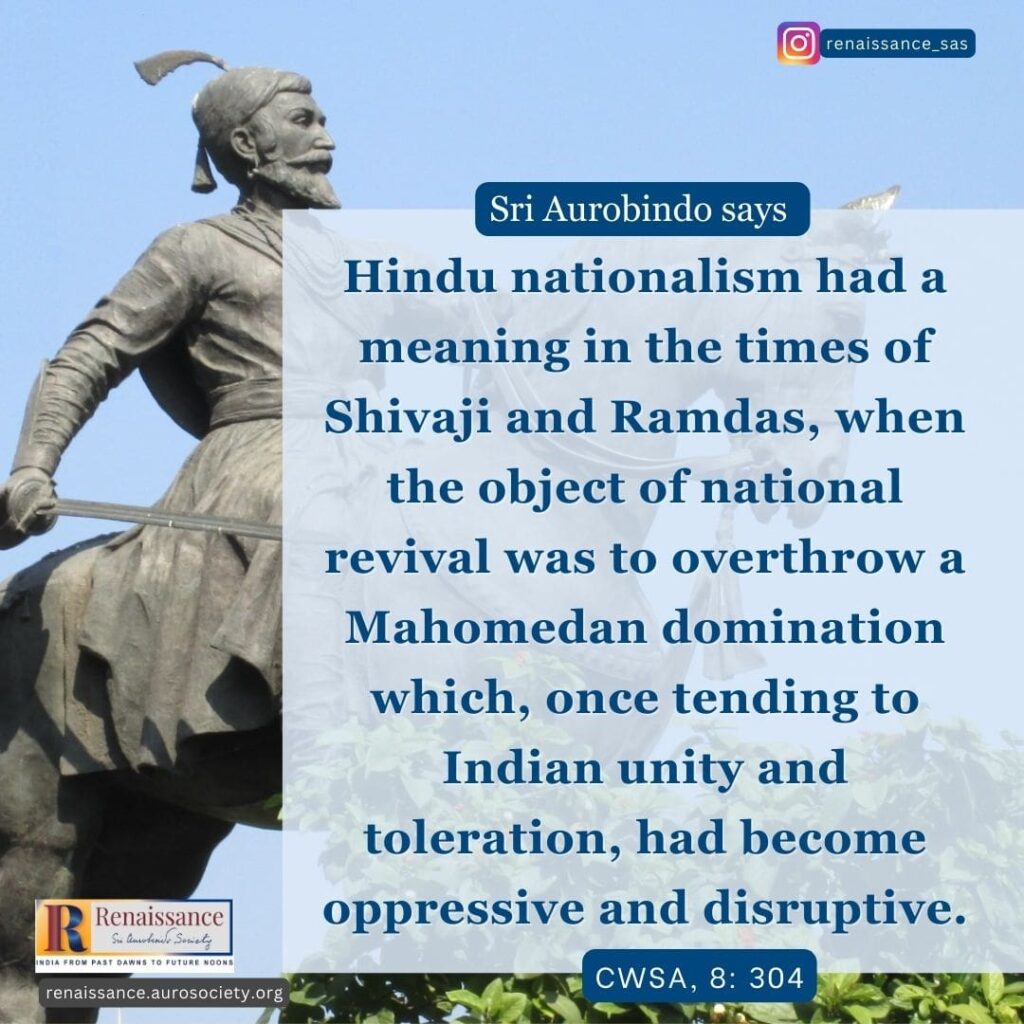
Don’t Miss This Quickread
What makes Chhatrapati Shivaji and his work great and highly significant in the historical march of Indian Civilization?
Things Necessary for Indian Nation
But under modern conditions India can only exist as a whole. A nation depends for its existence on geographical separateness and geographical compactness, on having a distinct and separate country. The existence of this geographical separateness is sure in the end to bear down all differences of race, language, religion, history. It has done so in Great Britain, in Switzerland, in Germany. It will do so in India.
But geographical compactness is also necessary. In other words, the desh or country must be so compact that mutual communication and the organisation of a central government becomes easy or, at least, not prohibitively difficult. The absence of such compactness is the reason why great Empires are sure in the end to fall to pieces; they cannot get the support of that immortal and indestructible national self which can alone ensure permanence. . . .
From our archives:
What Makes a Nation Immortal?
In addition, there must be a uniting force strong enough to take advantage of the geographical compactness and separateness,—either a wise and skillfully organised government with a persistent tradition of beneficence, impartiality and oneness with the nation, or else a living national sense insisting on its separate inviolability and self-realisation.
The secret of Roman success was in the organisation of such a government; even so, it failed, for want of geographical compactness, to create a world-wide Roman nationality. The failure of the British rule to root itself lies in its inability to become one with the nation either by the effacement of our national individuality or by the renunciation of its own separate pride and self-interest.
These things are therefore necessary to Indian nationality, geographical separateness, geographical compactness and a living national spirit. The first was always ours and made India a people apart from the earliest times. The second we have attained by British rule. The third has just sprung into existence.
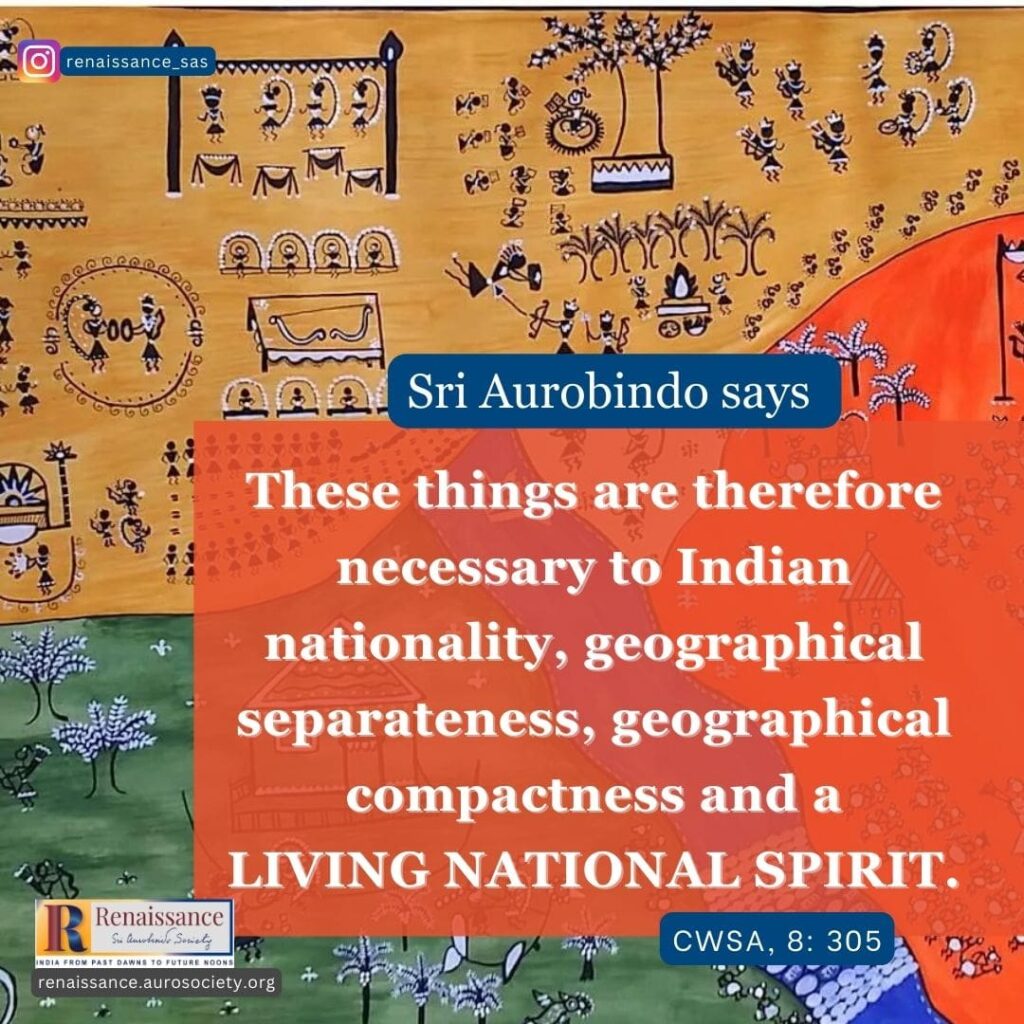
Swadesh as the Base of Indian Nationality
But the country, the swadesh, which must be the base and fundament of our nationality, is India, a country where Mahomedan and Hindu live intermingled and side by side. What geographical base can a Hindu nationality possess? Maharashtra and Rajasthan are no longer separate geographical units but merely provincial divisions of a single country. The very first requisite of a Hindu nationalism is wanting.
The Mahomedans base their separateness and their refusal to regard themselves as Indians first and Mahomedans afterwards on the existence of great Mahomedan nations to which they feel themselves more akin, in spite of our common birth and blood, than to us. Hindus have no such resource. For good or evil, they are bound to the soil and to the soil alone. They cannot deny their Mother, neither can they mutilate her.
The Hindu Nature of Indian Nationalism
Our ideal therefore is an Indian Nationalism, largely Hindu in its spirit and traditions, because the Hindu made the land and the people and persists, by the greatness of his past, his civilisation and his culture and his invincible virility, in holding it, but wide enough also to include the Moslem and his culture and traditions and absorb them into itself.
It is possible that the Mahomedan may not recognise the inevitable future and may prefer to throw himself into the opposite scale. If so, the Hindu, with what little Mahomedan help he may get, must win Swaraj both for himself and the Mahomedan in spite of that resistance. There is a sufficient force and manhood in us to do a greater and more difficult task than that, but we lack unity, brotherhood, intensity of single action among ourselves.
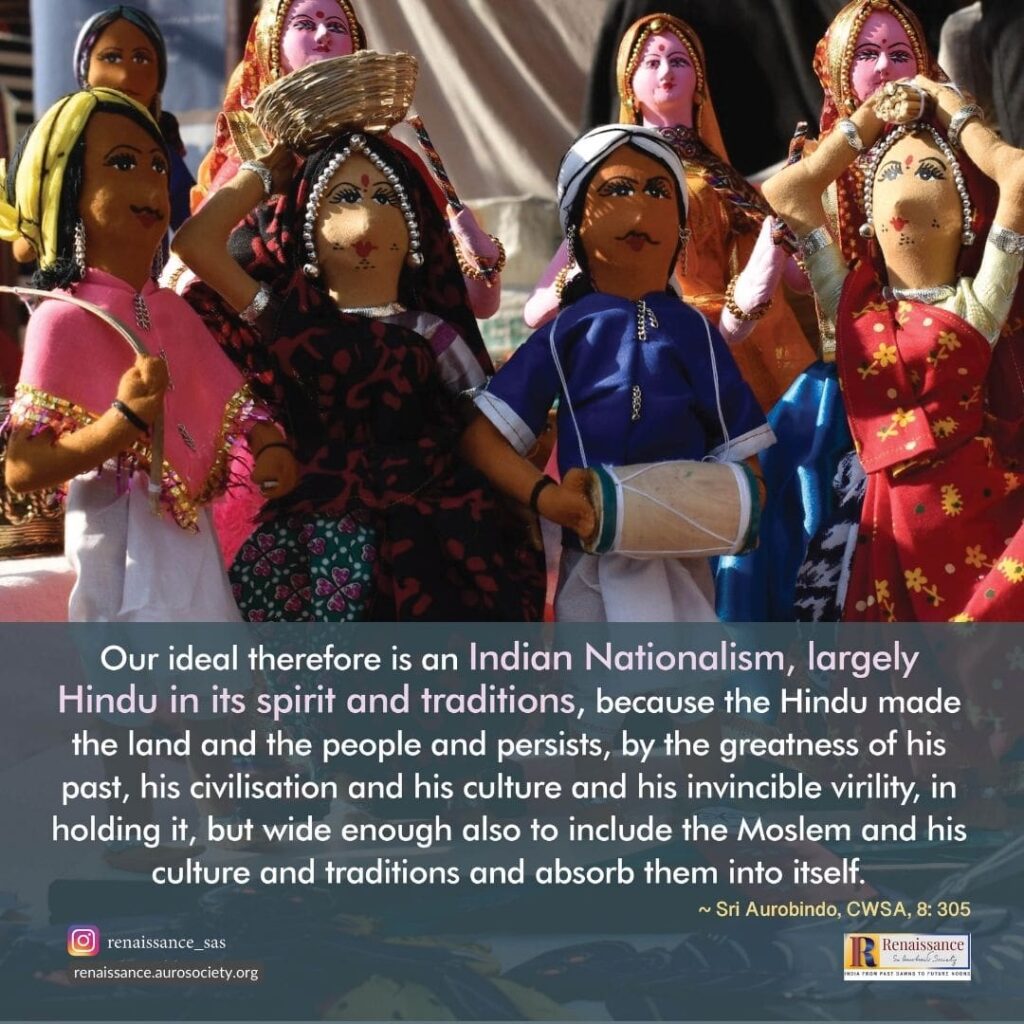

Spirit of Hinduism and Ideal of Nationalism
…the basic spirit of Hinduism…sees the one invariable and indivisible Divinity in every individual being. Nationalism is simply the passionate aspiration for the realisation of that Divine Unity in the nation, a unity in which all the component individuals, however various and apparently unequal their functions as political, social or economic factors, are yet really and fundamentally one and equal.
In the ideal of Nationalism which India will set before the world, there will be an essential equality between man and man, between caste and caste, between class and class, all being… different but equal and united parts of the Virat Purusha as realised in the nation.
The insistent preaching of our religion and the work of the Indian Nationalist is to bring home to every one of his countrymen this ideal of their country’s religion and philosophy.
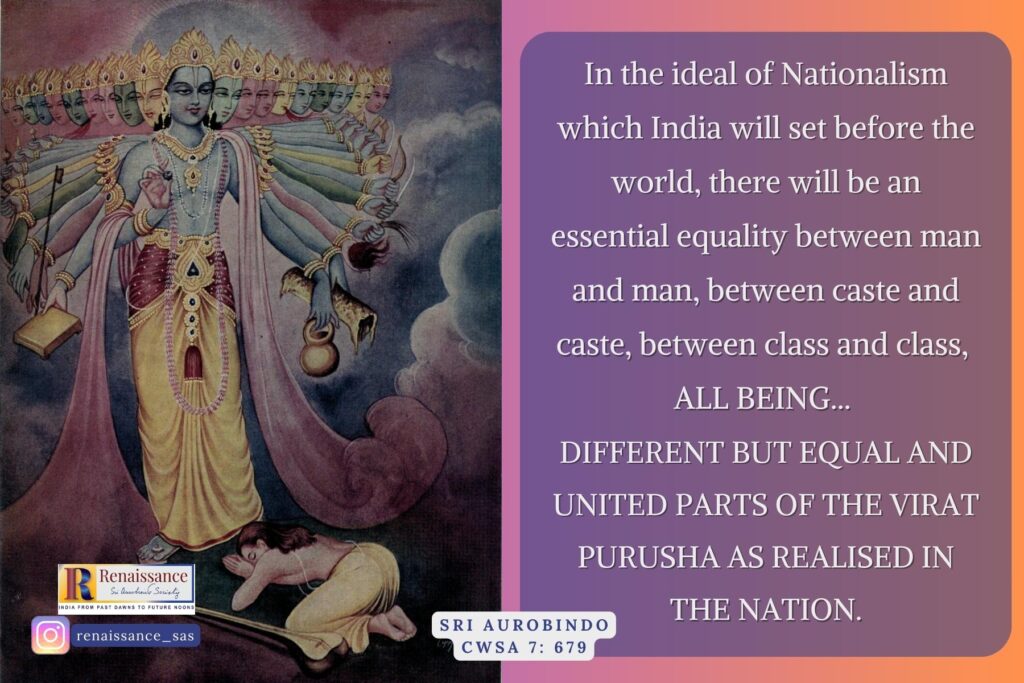
We are intolerant of autocracy because it is the denial in politics of this essential equality, we object to the modern distortion of the caste system because it is the denial in society of the same essential equality. While we insist on reorganising the nation into a democratic unity politically, we recognise that the same principle of reorganisation ought to and inevitably will assert itself socially;… for the principle once realised in politics must inevitably assert itself in society.
No monopoly racial or hereditary can form part of the Nationalist’s scheme of the future, his dream of the day for the advent of which he is striving and struggling.

~ Design: Beloo, Biswajita & Ramajayam

